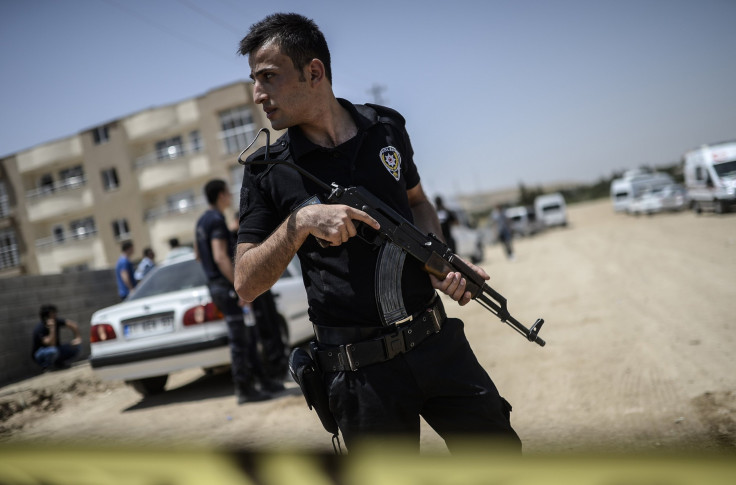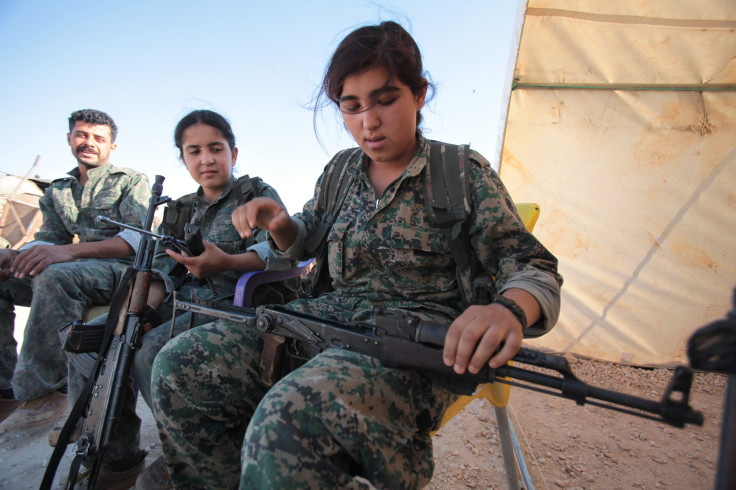Who Are The Kurds? In Turkey, ISIS Syria Conflict Threatens To Derail Reconciliation Between Kurdish Militants And Turkish Government

Recent violence in Turkey has reignited generations-long tensions between outlawed Kurdish parties and the Turkish government, threatening to derail progress made during talks between the two parties in recent years. And now it seems the two sides are locked in tit-for-tat retribution.
Kurdish groups have held the Turkish government accountable for a suicide bomb in the southern Turkish town of Suruc on Monday. The attack killed at least 31 people, mostly left-wing activists, and injured 100 others. Though the suicide bomber was apparently a 20-year-old Turkish Kurd and an Islamic State group supporter, Kurdish activists said the government failed to stem the influence of the militant group in the country. In retaliation, two Turkish officers were killed by Kurdish militants in the wake of Monday’s bombing, and the outlawed Kurdistan Workers’ Party (PKK) also claimed responsibility for the assassination of two ISIS supporters in a revenge killing for Monday’s violence.
Responding to the escalation in violence, the Turkish government launched a wide-crackdown against “terrorists,” by which they included both ISIS militants and members of the PKK. More than 250 people throughout the country were arrested Thursday and Friday.
Kurds are an ethnic group that inhabits a mountainous region that spans regions of Iran, Armenia, Turkey, Syria and Iraq. They speak their own distinct language, although many dialects exist. Although there exist many religious groups and sects among the Kurds, most adhere to Sunni Islam. Kurds began to consider a state of their own in the early 20th century, and although one was promised in 1920 by the Treaty of Sevres, their hopes were shot down three years later when a new treaty set the bounders of modern Turkey without any provisions for a Kurdish state. Over the following decades, governments in the region harshly suppressed any attempts at the creation of an autonomous Kurdistan.
Photogallery of the #Suruc attack victims' funeral in Istanbul #TwitterKurds http://t.co/2nGW8yRw6j pic.twitter.com/uZ8UrKq1GA
— Mutlu Civiroglu (@mutludc) July 24, 2015The Kurdistan Workers’ Party (PKK) was established in 1970 as a Marxist-Leninist guerilla group with the goal of establishing a Kurdish state. Since the 1980s, the outlawed organization has used violence in their fight for autonomy in Turkey’s predominantly-Kurdish southeast region. The group is labeled a terrorist organization by the United States, European governments and Turkey. The group’s leader, Abdullah Ocalan, was captured in 1999 and has been held in Turkish jails, where he has recently lightened his stance toward violence and has participated in a reconciliation process with the Turkish government.
Ocalan declared a ceasefire in March 2013, ending decades of continual conflict with the Turkish state. It was a landmark moment in a conflict that had seen hundreds of bombings and almost 40,000 deaths since the 1980s. At times, the truce has seemed shaky, but the ceasefire, unlike past attempts, was widely supported by both Turkish and Kurdish populations and parties. The call for peace also carried with it the opportunity for expanded freedoms for Kurds in the country.
Now, that calm is at risk. An umbrella of Kurdish organizations officially called for an end to the peace deal earlier this month and left-wing Kurdish groups like the PKK have expressed solidarity with Kurdish fighters in Syria, who have been battling the Islamic State since mid-2013. Many Turkish Kurds have joined the Kurdish Democratic Unity Party (YPG), the Kurdish armed wing of the Syrian Kurdish Democratic Unity Party, to fight against ISIS.

It appeared Monday’s violence was a spillover of fighting between Kurdish militants and ISIS in Syria. The bombing was targeted against a group of left-wing youth activists in Turkey’s southern Kurdish town of Suruc, who had volunteered to help rebuild the Kurdish Syrian city of Kobani, which has seen intense violence since last year. At the time, the youth were holding a picnic at a cultural center which has frequently hosted international journalists and Kurdish militants. At least 31 people were killed.
In some ways, the anger at the Turkish government rides on long-standing tensions between Kurds and the Turkish government. Kurdish activists say the Turkish government has been wary of taking a hard-handed approach against ISIS due to fear that supporting the fight against the militant group may work to bolster Kurds in Syria, thereby energizing Kurds in Turkey.
Kurds blamed Monday’s bombing on the Turkish government’s slow response to the ISIS threat. At rallies across the country in recent months, including this week, Kurds have chanted slogans along the lines: “The Turkish Government is collaborating with ISIS.”
Turkey, however, may end up facing more terror inside its territories, because airstrikes alone will neither stop #ISIS nor #PKK.
— Nervana Mahmoud (@Nervana_1) July 24, 2015A lot is at stake for Turkey. Unlike America, which sits thousands of miles from the civil war in Syria and Iraq, the war in Syria is on Turkey’s doorstep, and hundreds of sleeper cells are believed to operate within Turkey. Turkey also hosts nearly 2 million refugees. ISIS uses Turkey for transit and smuggling to and from Syria, and in return, Turkey has been shielded from much of the violence carried out by ISIS around the world.
But the recent escalation of violence between Kurds and the Turkish government has derailed progress made in reconciliation talks between the PKK and Turkish government and it's unclear whether violence between both sides will snap back to what it was just a few years ago. Some Turks living in predominantly-Kurdish cities in the southeast region have said they were worried of becoming the target of retributive violence and were taking safety precautions. There were also worries that anti-government Kurdish and left-wing protests and violence could spread throughout the country, as they did late last year as ISIS militants surrounded the Kurdish Syrian city of Kobani.
© Copyright IBTimes 2024. All rights reserved.






















